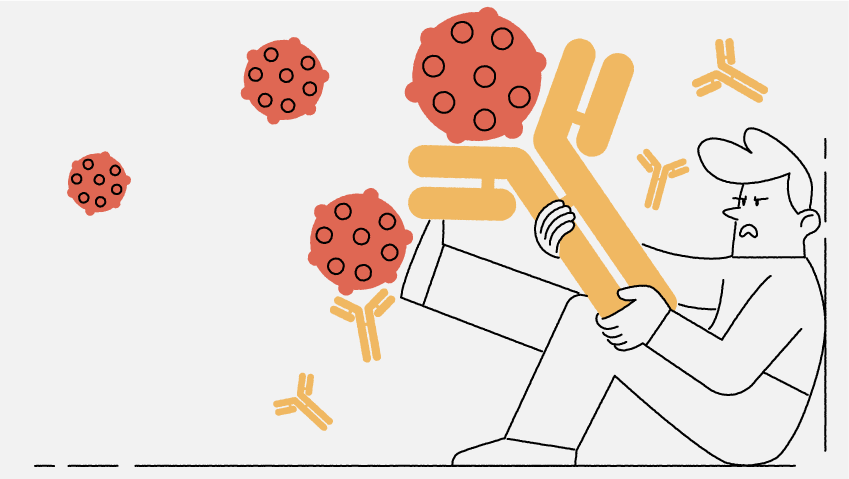Even After Mild COVID-19 Infection, Antibodies Protect From Reinfection for Up to Six Months
0 View
Share this Video
- Publish Date:
- 9 October, 2021
- Category:
- Covid
- Video License
- Standard License
- Imported From:
- Youtube
Tags

A Michigan Medicine study found that most patients with mild COVID-19 infections produce antibodies that persist and protect them from reinfection for up to six months.
Researchers analyzed nearly 130 subjects with PCR-confirmed COVID-19 disease between three and six months after initial infection. Three patients were hospitalized, while the rest were treated on an outpatient basis and experienced a mild infection, with symptoms such as headache, chills, and loss of taste or smell.
The results, published in Microbiology Spectrum, reveal that about 90% of the participants produced spike and nucleocapsid antibody responses, and all but one had sustained antibody levels at follow-up.
“Previously, there was a lot of concern that only those with severe COVID-19 produced strong antibody responses to infection,” said Charles Schuler, MD, lead author of the paper and clinical assistant professor of allergy and immunology at Michigan Medicine. “We show that people with mild attacks of COVID-19 did very well after their infection, making antibodies and preserving them.”
“Achieving natural immunity by delaying vaccination in favor of infection is not worth going through the discomfort, the risks to yourself and the risks to others.”
— Charles Schuler, MD
The participants in the prospective study were Michigan Medicine health professionals or patients at high risk of exposure to COVID-19. Most subjects participated in the same research team’s previous study, which found that COVID antibody tests are effective in predicting prior infection.
During the observation period, none of the antibody-producing subjects were reinfected, compared to 15 antibody-negative subjects. Schuler’s team also found that the ability of the antibodies to neutralize COVID-19 did not differ significantly from the first visit, which occurred three months after infection, to the second visit at six months.
“While some studies have suggested that antibodies to COVID-19 decline over time, these findings provide strong prospective evidence for longer-term immunity for those who produce an immune response to a mild infection,” says James Baker Jr., MD. , senior author of the paper and founding director of the Mary H. Weiser Food Allergy Center at Michigan Medicine. “To our knowledge, this is the first prospective study demonstrating such a risk reduction for clinical reinfection in this particular type of population.”
Impact on COVID vaccination
The team of researchers is now analyzing samples from this subject group taken up to a year after infection to further evaluate antibody responses. Meanwhile, they concluded that individuals with COVID-19 can delay vaccination for up to 90 days after the end of the infection. The Centers for Disease Control and Prevention recommends that those being treated with monoclonal antibodies or convalescent plasma wait 90 days after receiving treatment before being vaccinated, and others should wait until they have recovered from COVID-19 and “meet the criteria to end isolation.”
A study conducted in Kentucky found that unvaccinated people who already had COVID-19 were 2.34 times more likely than fully vaccinated people to be reinfected, suggesting that “vaccination provides additional protection against reinfection.”
In addition, the study was conducted between March 2020 and February 2021, months before the highly transmissible Delta strain became the dominant strain of COVID in the United States.
Amid increasing cases and hospitalizations, Schuler said, staying unvaccinated comes with “a high price” for immunity.
“These results are encouraging for those who have already gone through the gauntlet of COVID-19 infection,” he said. “However, I do not recommend citing this study as a reason not to get vaccinated for those who have never been infected before. Vaccination reduces contagiousness, the risk of hospitalization and deaths from COVID-19, without having the actual infection. Achieving natural immunity by delaying vaccination in favor of infection is not worth going through the discomfort, the risks to yourself and the risks to others.”
Reference: “Mild SARS-CoV-2 disease is not associated with reinfections and provides sustained spikes, nucleocapsid and virus neutralizing antibodies” by Charles F. Schuler, IV, Carmen Gherasim, Kelly O’Shea, David M. Manthei, Jesse Chen, Cristyn Zettel, Jonathan P. Troost, Andrew A. Kennedy, Andrew W. Tai, Donald A. Giacherio, Riccardo Valdez, James L. Baldwin, and James R. Baker, Jr, September 1, 2021, Microbiology Spectrum.
DOI: 10.1128/Spectrum.00087-21
Funding: University of Michigan Institutional Funding, COVID-19 Innovation Grant










